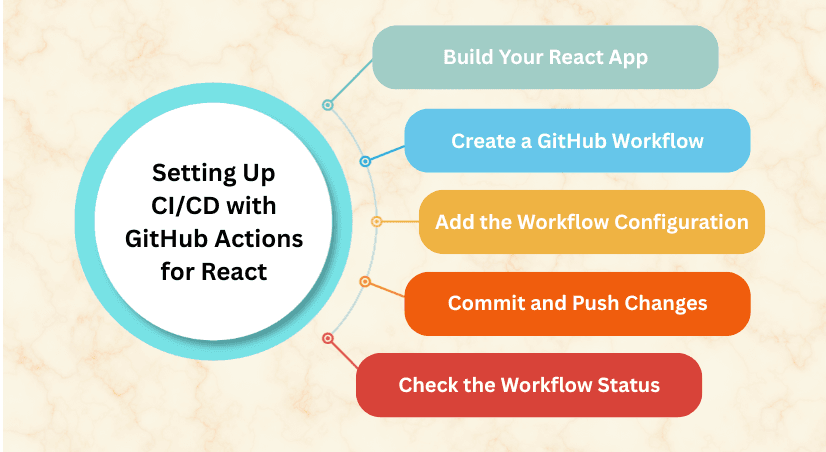CI/CD Integration – Automated Deployments with GitHub Actions
Modern web development is not just about writing code — it’s about automating everything from testing to deployment. In React projects, CI/CD (Continuous Integration and Continuous Deployment) helps ensure that every code change is tested, built, and deployed automatically — saving time, reducing errors, and improving team efficiency.
What is CI/CD?
CI/CD stands for:
- Continuous Integration (CI) → Automatically test and build your code whenever changes are pushed to the repository.
- Continuous Deployment (CD) → Automatically deploy your app after the build and tests pass successfully.
Together, they create a pipeline that delivers your app to users faster and more reliably.
Why Use CI/CD in React Projects?
Using CI/CD for your React apps brings several key advantages:
- No manual deployment – Your app is automatically deployed when you push code.
- Fewer bugs – Automated testing ensures quality before release.
- Consistent builds – The same environment builds every time.
- Faster feedback – You know immediately if something breaks.
- Collaboration ready – Perfect for teams using GitHub.
Setting Up CI/CD with GitHub Actions for React
GitHub Actions lets you automate workflows directly inside your GitHub repository. It uses YAML configuration files stored in .github/workflows/.
Let’s create one for a React project.

Step 1: Build Your React App
Before setting up CI/CD, ensure your app builds correctly:
npm run build
Step 2: Create a GitHub Workflow
Inside your project, create this file:
.github/workflows/deploy.yml
Step 3: Add the Workflow Configuration
Here’s an example GitHub Actions workflow for deploying a React app to GitHub Pages automatically:
name: Deploy React App
on:
push:
branches:
- main # Deploy when changes are pushed to 'main' branch
jobs:
build-and-deploy:
runs-on: ubuntu-latest
steps:
- name: Checkout code
uses: actions/checkout@v4
- name: Setup Node.js
uses: actions/setup-node@v4
with:
node-version: 18
- name: Install dependencies
run: npm install
- name: Build React app
run: npm run build
- name: Deploy to GitHub Pages
uses: peaceiris/actions-gh-pages@v4
with:
github_token: ${{ secrets.GITHUB_TOKEN }}
publish_dir: ./build
Step 4: Commit and Push Changes
Once you’ve added the workflow file, push it to your GitHub repo:
git add .
git commit -m "Add GitHub Actions deployment workflow"
git push origin main
Now, GitHub Actions will automatically:
- Install dependencies
- Build your React app
- Deploy the
/buildfolder to GitHub Pages
Step 5: Check the Workflow Status
Go to your GitHub repo → Actions tab
You’ll see the CI/CD workflow running live — showing each build, test, and deployment step in real time.
CI/CD for Netlify or Vercel
If you’re deploying on Netlify or Vercel, CI/CD is even simpler:
- Netlify: Connect your GitHub repository → every push automatically triggers a new build.
- Vercel: Automatically detects your framework (React/Next.js) and redeploys after every commit.
No YAML setup needed — it’s all handled by the platform.
Using Environment Variables in GitHub Actions
You can add sensitive data like API keys securely in your repository:
- Go to GitHub → Settings → Secrets and Variables → Actions
- Add a new secret, e.g.
REACT_APP_API_KEY - Access it in your workflow:
env:
REACT_APP_API_KEY: ${{ secrets.REACT_APP_API_KEY }}
Adding Tests to Your CI/CD Pipeline
To make your pipeline more robust, you can add automated tests before deployment:
- name: Run tests
run: npm test -- --watchAll=false
If the tests fail, the deployment will stop automatically — ensuring code quality.
Benefits of GitHub Actions for React Deployment
| Feature | Benefit |
|---|---|
| Automated Deployment | Deploys instantly after every push |
| Testing Integration | Runs tests automatically |
| Reusable Workflows | Share and scale CI/CD setups |
| Secure Secrets | Keeps API keys safe |
| Cross-Platform | Works with GitHub Pages, Netlify, Vercel, AWS, etc. |

